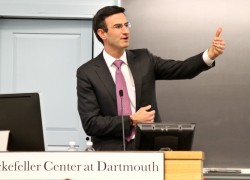
Drawing on experience from both his time in government and his current position in the private sector as vice chairman of global banking at Citigroup, Inc., Peter Orszag outlined the three main features of the current political and economic situation to a crowd at Dartmouth College on Wednesday. “The new U.S. political economy” is a product of changes to the global labor supply, slow growth following the recession and increased polarization of politics, Orszag said.
The “underlying tectonic plate shift for the global labor supply” has led to lower wages and stiffer international job competition, factors that will especially affect the generation of college students soon to enter the workforce, according to Orszag, who has served as director of the Congressional Budget Office and director of the Office of Management and Budget.
While a Dartmouth degree was once “virtually guaranteed” to result in financial security, this path has become increasingly uncertain in recent years, he said.
He also said the current political and economic climate has been influenced by “surface waves of the lingering aftermath of the financial crisis,” which hit during Orszag’s tenure at the Congressional Budget Office. The effects of the recession have lasted much longer than most people expected, he said.
“Every formal macroeconomic model in 2009 got this wrong,” he said. “The people who got that prediction right were basing their analyses on historical examples.”
Orszag said recovery would have been smoother if the stimulus package were made to reflect the slow nature of the progress that followed the recession through strategies such as the use of measures tied to the unemployment rate.
“Warren Buffett and I, about a year ago, were having a discussion about the unemployment rate in 2012,” Orszag said.
Whereas Buffett predicted a rate of 7.3 percent or lower, the current rate is a full percentage point higher, and this slow growth rate has been painful to a large segment of the American workforce, according to Orszag.
“We are some way through the process of adjusting to that shock, but we’re not all the way through it,” he said. “We have almost four million people who’ve been unemployed for more than a year, and those are the people that haven’t given up.”
The central dilemma of the political economy over the course of the next decade, however, is the “hyperpolarization” of politics, Orszag said.
“In a sense, the middle does not exist anymore, especially in the House of Representatives,” he said. “The question is whether it’s an inside-the-beltway phenomenon or whether it’s a we-the-people phenomenon.”
The typical explanation of this extremism in New York and Washington political communities describes the trend based on gerrymandering — or the reorganization of political districts that now look like “spaghetti” — in order to achieve particular results in elections.
Nonetheless, the district reorganization does not explain the lack of moderates, given that the Senate also exhibits polarization but state lines have remained constant, he said.
It is possible that individual members of Congress have become less centrist, because a single state can be represented by two different parties in the Senate, but this understanding fails to account for increasing polarization of individual state legislatures, according to Orszag. The remaining answer is that polarization is “partly, if not mostly, an outside-the-beltway phenomenon,” he said.
Orszag cited trends of citizens moving into neighborhoods that are overwhelmingly distinguished by party affiliation and income level and of new media offering the public increasingly partisan sources of information.
“Physically and virtually, we are surrounding ourselves with like-minded people,” Orszag said.
Although changing the American public is harder than changing districts or Congressional representatives, it can be done, he said.
“It would help all of us to make an affirmative effort to surround ourselves not only with like-minded people but to hear out the other side,” Orszag said in an interview with The Dartmouth. “That, ultimately, will be the only thing that can counteract this increasingly bimodal trend.”
The phenomena of a globalized workforce, lingering recession and polarized public are just three of the areas Orszag has examined during his career.
“When [President Barack] Obama hits the campaign trail, I doubt you’ll hear him refer to a policy that has not been in some way helped by Orszag’s expertise,” economics professor Andrew Samwick said.
Orszag’s lecture was part of the Rockefeller Center’s annual public programming, according to Rockefeller Center Associate Director Ronald Shaiko. Shaiko said he invited Orszag to speak to his Introduction to Public Policy class to provide a “practitioner’s point of view” on the application of studying public policy to Washington realities.
“I thought it was really great that he was able to come into class and answer students’ individual questions,” Madeline Abbott, a student in Shaiko’s class, said. “I enjoyed the mix of insider information and entertaining stories.”
